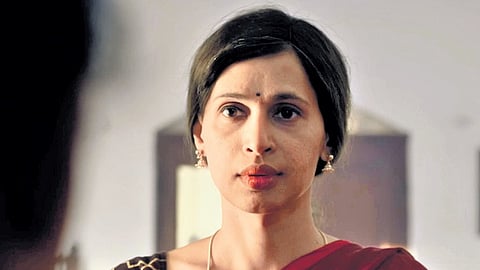

Samyuktha Vijayan’s Neela Nira Sooriyan is not a film to be critiqued from the privileged lens of a male. The film is a poignant account of a person who transitions from male to female; it’s a deeply personal journey replete with struggles, some you might know of, many you might not. The film opens in Pollachi, where Aravind (Samyuktha), a school teacher, detests being seen as a man by his family.
His reluctance to step outside of the comfort of his room seems to stem from the burden of having to present as male to the world. Exhausted by leading a double life, Aravind decides to open up about the hormone blockers he has been taking and goes ahead with gender-affirming surgery to become Bhanu. The film then follows how society reacts to Aravind’s transition.
One of the film’s strengths lies in Samyuktha’s unfiltered writing of the characters, with a screenplay that avoids dramatic highs and camera gimmickry. The narrative is grounded in realistic interactions between characters, focusing on challenges they might genuinely face rather than contrived external crises. Aravind’s double life is portrayed with clarity: from his meticulous shaving routine to taking voice training to sound more feminine, and evading marriage proposals.
His parents, played by Geetha Kailasam and Gajaraj, are typical Tamil parents—confused and shocked by their son’s transition. The performances, as you can expect from seasoned artists, are in place, but perhaps their eventual acceptance of Bhanu feels somewhat rushed, and perhaps their characters might have benefited from deeper exploration.
Prasanna Balachandran, who plays Aravind’s uncle, is a perfect fit for his conservative role, delivering flawless Kongu Tamil. His line, “Modhalla adutha maasathula vara sambalathula oru bullet vandi vaangu, pombala maadhri scooter la poitu irukka” is the sort of malicious humour Aravind must be at the receiving end of, every day.
Supporting characters like Karthik (Masanth), Nancy (Manimegalai), and the school correspondent are used effectively to provide social commentary. Nancy, the vice principal, fights to preserve the school’s dignity and warns Aravind against acting against “culture.” In her brief screen time, her personal beliefs about modest living are effectively conveyed through her rebuke of children wearing makeup.
Semmalar Annam, as Aravind’s sister, delivers a powerful scene in which she disapproves of his transition—not for cultural reasons, but because she believes the world won’t treat him with any special regard as a woman. Her line, “Naa ponna irundhu ennatha kanden, kalyanam aagi 8 varsham aachu… kolandha illa. Enna kelvi kekra yaarum unga maamana kekka maatanga,” aptly reflects the grim reality she believes awaits Aravind—perhaps even worse, considering Bhanu may not be seen as a ‘real woman’ by society at large.
The film shines in its portrayal of the societal challenges Bhanu faces, as seen in the Tehsildar office scene where Bhanu protests being labeled transgender instead of simply a woman. The film also courageously criticizes tokenism from woke progressives, as shown in the school chairman’s insincere motives for supporting Bhanu’s transition—motivated by a desire for international recognition rather than genuine compassion. There’s an added layer of commentary when Bhanu herself doesn’t quite come across as an ally for a student who seems gender-fluid.
However, the film does miss a chance to fully explore Aravind’s childhood struggles, a gap that leaves the audience somewhat disconnected from his internal journey. The brief exposition, “Naa chinna vayasulirundhe enna ponna dhaan nenachikitruken,” lacks the depth that a few childhood scenes could have provided. In conclusion, Neela Nira Sooriyan avoids the commercial trappings often used to hook audiences. Instead, it draws us into the lived experiences of transpersons, making us feel both curious and moved.
Director: Samyuktha Vijayan
Cast: Samyuktha Vijayan, Gajaraj, Manimegalai, Masanth, Geetha Kailasam
Rating : 3/5